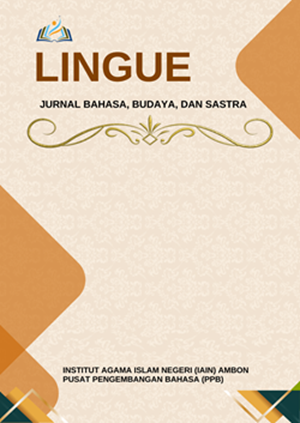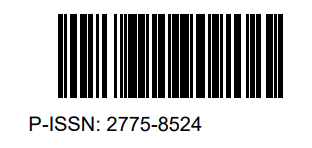ANALISIS SENTIMEN BAHASA PADA ULASAN DALAM MEMPENGARUHI CITRA MERK PRODUK
DOI:
https://doi.org/10.33477/lingue.v5i1.5378Abstract
Abstract
This study aims to analyze the sentiment of consumer reviews language towards the formation of brand image of a product in the context of online purchasing. This research focuses on how the language used in consumer reviews can influence perceptions of a product's brand image. A qualitative method is employed to gain in-depth insights into how consumers respond to existing product reviews. The sample consists of consumers who actively read other consumers' reviews before making a purchase. The results of the research show that sentiment language plays a role in shaping consumers' perceptions of a product's brand image. Positive sentiments in reviews tend to reinforce a positive brand image, while negative sentiments tend to damage it. The interpretation of sentiments is influenced by how much they align with consumers' preferences and their intensity. Strong sentiments have a more significant impact on brand image formation. Contextual factors and product characteristics also play a role in the influence of sentiment language on brand image. Products that are important to consumers have a greater impact of sentiment on brand perception.
Keywords: Sentiment Language, brand image, reviews
Abstrak
Penelitian ini bertujuan untuk menganalisis sentimen bahasa ulasan konsumen terhadap pembentukan citra merek produk dalam konteks pembelian online. Penelitian ini difokuskan pada bagaimana bahasa yang digunakan dalam ulasan konsumen dapat mempengaruhi persepsi terhadap citra merek suatu produk. Metode kualitatif digunakan untuk mendapatkan wawasan yang mendalam tentang bagaimana konsumen merespons ulasan produk yang ada. Sampel terdiri dari konsumen yang secara aktif membaca ulasan konsumen lain sebelum melakukan pembelian produk. Hasil penelitian menunjukkan bahasa sentimen memiliki peran dalam membentuk persepsi konsumen terhadap citra merek produk. Sentimen positif dalam ulasan cenderung memperkuat citra merekpositif, sementara sentimen negatif cenderung merusak citra merek. Interpretasi sentimen dipengaruhi oleh sejauh mana sentimen tersebut sejalan dengan preferensi konsumen dan intensitasnya. Sentimen yang sangat kuat memiliki dampak yang lebih signifikan pada pembentukan citra merek. Faktor kontekstual dan karakteristik produk juga memainkan peran dalam pengaruh bahasa sentimen pada citra merek. Produk yang penting bagi konsumen memiliki dampak sentimen yang lebih besar pada persepsi merek.
Kata Kunci: Bahasa Sentimen, Citra Merek, Ulasan
References
Barreda, A. A., Nusair, K., Wang, Y., Okumus, F., & Bilgihan, A. (2020). The impact of social media activities on brand image and emotional attachment: A case in the travel context. Journal of hospitality and tourism technology, 11(1), 109-135.
Chen, L., Halepoto, H., Liu, C., Kumari, N., Yan, X., Du, Q., & Memon, H. (2021). Relationship analysis among apparel brand image, self-congruity, and consumers’ purchase intention. Sustainability, 13(22), 12770.
Chen, W., Gu, B., Ye, Q., & Zhu, K. X. (2019). Measuring and managing the externality of managerial responses to online customer reviews. Information Systems Research, 30(1), 81-96.
Dai, H., Chan, C., & Mogilner, C. (2020). People rely less on consumer reviews for experiential than material purchases. Journal of Consumer Research, 46(6), 1052-1075.
Dwivedi, Y. K., Ismagilova, E., Hughes, D. L., Carlson, J., Filieri, R., Jacobson, J., ... & Wang, Y. (2021). Setting the future of digital and social media marketing research: Perspectives and research propositions. International Journal of Information Management, 59, 102168.
El-Said, O. A. (2020). Impact of online reviews on hotel booking intention: The moderating role of brand image, star category, and price. Tourism Management Perspectives, 33, 100604.
Hardini, S., & Sitohang, R. (2019). The use of language as a socialcultural communication. Jurnal littera: fakultas sastra darma agung, 1(2), 238-249.
Haryanti, E. (2019). Penggunaan bahasa dalam perspektif tindak tutur dan implikasinya bagi pendidikan literasi. Jurnal Tambora, 3(1), 21-26.
Herrando, C., Jiménez-Martínez, J., Martín-De Hoyos, M. J., & Constantinides, E. (2022). Emotional contagion triggered by online consumer reviews: Evidence from a neuroscience study. Journal of Retailing and Consumer Services, 67, 102973.
Khatoon, S., & Rehman, V. (2021). Negative emotions in consumer brand relationship: A review and future research agenda. International Journal of Consumer Studies, 45(4), 719-749.
Kim, S. J., Maslowska, E., & Tamaddoni, A. (2019). The paradox of (dis) trust in sponsorship disclosure: The characteristics and effects of sponsored online consumer reviews. Decision Support Systems, 116, 114-124.
Liu, B. (2022). Sentiment analysis and opinion mining. Springer Nature.
Loureiro, M. L., & Alló, M. (2020). Sensing climate change and energy issues: Sentiment and emotion analysis with social media in the UK and Spain. Energy Policy, 143, 111490.
Mehta, P., & Pandya, S. (2020). A review on sentiment analysis methodologies, practices and applications. International Journal of Scientific and Technology Research, 9(2), 601-609.
Nandwani, P., & Verma, R. (2021). A review on sentiment analysis and emotion detection from text. Social Network Analysis and Mining, 11(1), 81.
Pina, R., & Dias, Á. (2021). The influence of brand experiences on consumer-based brand equity. Journal of brand Management, 28, 99-115.
Qian, L., Grisolía, J. M., & Soopramanien, D. (2019). The impact of service and government-policy attributes on consumer preferences for electric vehicles in China. Transportation Research Part A: Policy and Practice, 122, 70-84.
Srivastava, V., & Kalro, A. D. (2019). Enhancing the helpfulness of online consumer reviews: the role of latent (content) factors. Journal of Interactive Marketing, 48(1), 33-50.
Tuorila, H., & Hartmann, C. (2020). Consumer responses to novel and unfamiliar foods. Current Opinion in Food Science, 33, 1-8.
Ventre, I., & Kolbe, D. (2020). The impact of perceived usefulness of online reviews, trust and perceived risk on online purchase intention in emerging markets: A Mexican perspective. Journal of International Consumer Marketing, 32(4), 287-299.
Yue, C. A., Men, L. R., & Ferguson, M. A. (2021). Examining the effects of internal communication and emotional culture on employees’ organizational identification. International Journal of Business Communication, 58(2), 169-195.
Zahra, A. R., Syahputra, R., & Suhairi, S. (2022). Analisis Komunikasi Dalam Bisnis. Da'watuna: Journal of Communication and Islamic Broadcasting, 2(1), 25-34.
Zhang, J. (2019). Cognitive functions of the brain: perception, attention and memory. arXiv preprint arXiv:1907.02863.
Downloads
Published
How to Cite
Issue
Section
License
If accepted for publication, the copyright of the article belongs to the author. Copyright includes the exclusive right to reproduce or transmit manuscripts in any form and media: reprint, produce photographs, microfilm, or translated versions of the manuscript. Increasing parts of this journal, storage and transmission of databases of any form or media, such as electronic copies, electrostatic and mechanical copies, photocopies, recordings, magnetic media and so on are permitted without permission. LINGUE: Jurnal Bahasa, Budaya dan Sastra, allow readers to read, download, copy, distribute, print, search, or link the fulltext of its articles and allow readers to use them for any other lawful purpose. However, it can not be used for commercial purposes
Jika diterima untuk publikasi, hak cipta artikel adalah milik penulis. Hak Cipta mencakup hak eksklusif untuk mereproduksi atau mengirimkan manuskrip dalam bentuk dan media apa pun: mencetak ulang, menghasilkan foto, mikrofilm, atau versi terjemahan dari manuskrip tersebut. Memperbanyak bagian jurnal ini, penyimpanan dan transmisi database dalam bentuk atau media apa pun, seperti salinan elektronik, salinan elektrostatis dan mekanis, fotokopi, rekaman, media magnetis, dan sebagainya diizinkan tanpa izin. LINGUE: Jurnal Bahasa,Budaya dan Sastra, memungkinkan pembaca untuk membaca, mengunduh, menyalin, mendistribusikan, mencetak, mencari, atau menautkan teks lengkap artikelnya dan memungkinkan pembaca untuk menggunakannya untuk tujuan yang sah lainnya. Namun, tidak dapat digunakan untuk tujuan komersial

LINGUE : Jurnal Bahasa, Budaya, dan Sastra Ciptaan disebarluaskan di bawah Lisensi Creative Commons Atribusi-TanpaTurunan 4.0 Internasional.







